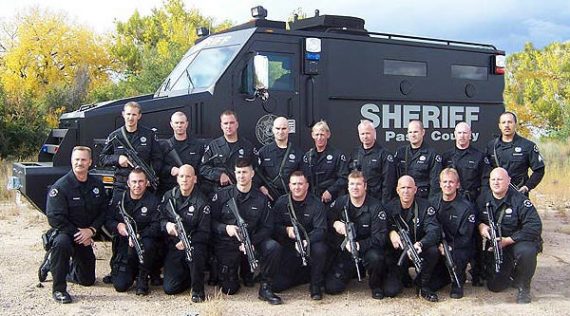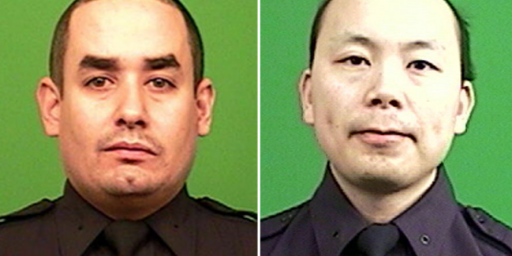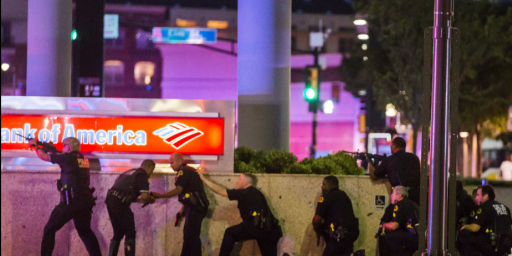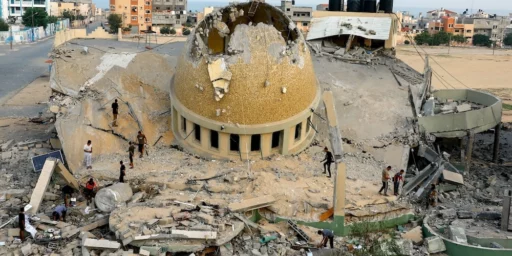Militarization of Police
David Rittgers, a legal policy analyst at the Cato Institute who served three tours in Afghanistan as a special forces officer, laments the militarization of police in America.
David Rittgers, a legal policy analyst at the Cato Institute who served three tours in Afghanistan as a special forces officer, laments the militarization of police in America.
The sheriff’s office in Pima County, Ariz., raided the home of former Marine and Iraq combat veteran Jose Guerena, shooting 71 rounds at Guerena and hitting him with 22. The department is now facing a serious controversy over Guerena’s death.
But the raid isn’t the real tragedy. It’s a symptom of the real tragedy: the militarization of U.S. law enforcement.
Pima County released a video of the raid and supporting documents. The video isn’t anything new — a squad of police officers dressed up for combat. But the statement of the SWAT supervisor is worth reading. After the SWAT team entered Guerena’s home, the supervisor left one or two “operators” with the body while the rest searched the house.
What did he mean by operator? Well, a police officer. But the term connotes something entirely different.
“Operator” is a term of art in the special operations community. Green Berets, SEALs and other special operations personnel often refer to themselves as operators. It’s a recognition of both the elite standards of their units and the hybrid nature of their duties — part soldier, part spy, part diplomat. But importing operator terminology into domestic law enforcement is not a benign turn of the phrase.
Perceiving yourself as an operator plasters over the difference between a law enforcement officer serving a warrant and a commando in a war zone. The former Mirandizes, the latter vaporizes, as the saying goes — and as the recent Osama bin Laden raid vividly illustrated.
Targeted killing is legal in a war zone but not on the streets of Anytown, USA. The war on drugs has done incalculable damage to the character of law enforcement by encouraging police officers to forget they are civilians.
True, they are civilians charged with enforcing the law and are empowered to use force to do so — but they are civilians nonetheless. When police officers refer to their fellow citizens as civilians and mean to exclude themselves from that category, they’ve mentally leapt from enforcing the law to destroying the enemies of the state. That’s incompatible with a free society.
Radley Balko and others have been writing about this problem for years. Sadly, there’s virtually no public appetite to do anything about it.







“Sadly, there’s virtually no public appetite to do anything about it.”
The lack of comments on this post makes your point rather powerfully.
I’d have a lot more to say, but it’s just too damn depressing.
It depresses me everytime I pass a “policeman” in a public space dressed all in black tactical uniform and gear, body armor, and carrying military issued automatic weapons. I’m sure those guys and gals get a big kick out of it, but it depresses the hell out of me. I used to think, years ago when I lived in Europe, that we’d never see these things in my own country, or that we would never accept that level of militarization in our society. I was sadly wrong. It’s all security theater window dressing, but the public buys it thinking it makes us safer.
Here in Chicago you can apply for a job as a policeman with a high school diploma and two years of military service. Median total compensation for a Chicago police officer is around $80,000. Pretty good for high school only.
We should be surprised that police departments are militarized?
Obviously that’ll be a popular sentiment on college campuses and on the Internet. I can also see why military guys might object to the exclusivity of their turf being encroached upon, even if that’s not really the case.
For people in the working classes and living in places such as Detroit, L.A., Chicago, Philly, New Orleans, Camden, Newark, Baltimore and Oakland, and along the southern border, however, the sentiment would be quite different about the need for aggressive and capable law enforcement. Then when you compare the glittering jewel of New York City of today (post “militarization” of the NYPD) with the unmitigated disaster of the crime-infested 1970’s and 1980’s the dichotomy nearly is unbelievable. I don’t think you’ll find too many people complaining about it, except of course the criminal element and trust fund babies at SoHo cocktail parties.
“I don’t think you’ll find too many people complaining about it, except of course the criminal element and trust fund babies at SoHo cocktail parties.”
See, James? Not only do too few people care, some take the opposite view.
Unless they get their junk felt up by the TSA or have their taxes raised by a penny.
Then it’s “FREEDOM!!!” and marching in the streets.
Oh, don’t think that the “Tsar Nicholas” types out there won’t be screaming if the militarized police actually turn their gaze towards them. The machine guns and assault vehicles are all meant to keep “us” safe from “them.” Of course, those working class people in the cities he seems to think are hellholes all too often know that to these cops they will always be “them.”
@wr – remember the “Jack Booted Thugs” of David Koresh and Janet Reno fame?
Then when you compare the glittering jewel of New York City of today (post “militarization” of the NYPD) with the unmitigated disaster of the crime-infested 1970′s and 1980′s the dichotomy nearly is unbelievable.
Citation needed. That statement has no basis in any known fact. Giuliani didn’t clean up NYC with SWAT teams.
Most of the public doesn’t really care about the rule of law and only worries about right when it’s THEIR rights in question. The fact the police are brutal and above the law isn’t a bug, it’s a feature, as long as the abuse is confined to “the bad guys” (generally the poor and minorities).
exactly. to deploy ‘troops’ to these hotspots would do little except pick fights and exacerbate the problem, as opposed to addressing the root causes (ie: cyclical poverty, lack of avenues for societal growth). it strikes me as confusing tactics with strategy, and it gets at the basis of my issues with the war on drugs in general.
New York City’s drop in crime rate was as a direct result of the implementation of the Broken Window Theory
Unfortunately I can’t see this changing unless the War on Drugs ends. Even though I’m sure the SWAT type units are used for almost everything, it seems the War on Drugs provides a lot of cover for the increased militarization.
Fairfax County’s standard procedure is to use SWAT to serve all warrants. This is how a nonviolent suspect accused of bookmaking was shot to death by “mistake” by a SWAT member during the serving of the warrant for his arrest.
Except that it wasn’t, because crime dropped by roughly the same amount in pretty much every city over the same time period, whether the implemented broken window policies or not.
DC:
if you have the toys, why not use them, right?
This militarization of the police will stop when there are no-knock raids and shootings of innocent people and pets in neighborhoods in Northern Virginia and Long Island rather than in inner-city Baltimore and Washington…